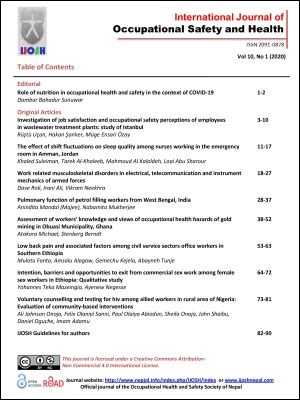Investigation of Job Satisfaction and Occupational Safety Perceptions of Employees in Wastewater Treatment Plants: Study of Istanbul
DOI:
https://doi.org/10.3126/ijosh.v10i1.29876Keywords:
Job satisfaction, Occupational health and safety, occupational safety perception, wastewater treatment plantAbstract
Background: There exist many fatal occupational accidents in the works carried out in wastewater treatment plants.
Objective: This research was carried out to determine the relationship between job satisfaction levels and occupational safety perceptions of employees working in wastewater treatment plants.
Methods: In this study, a questionnaire including Minnesota Job Satisfaction Scale and Occupational Safety Scale is applied to a total of 161 people aged 16-65 years working in two different Advanced Biological Wastewater Treatment Plants in Istanbul by simple random sampling. Statistical Package for Social Science version-22 was used. Seventeen hypotheses were analyzed to show the relation between the occupational safety perceptions and socio-demographic parameters of employees.
Results: The results show that there is no significant relationship between job satisfaction and occupational safety perception of the personnel working in wastewater treatment plants (F=0.096 and p=0.227 >0.05). On the other hand, it is found that there is a statistically significant difference between the level of job satisfaction perception and age of the employees (F=2.358 and p=0.002 <0.05), as well as monthly income ranges (F=4.126 and p=0.008 <0.05).
Conclusion: Consequently, the hazards associated with the work should be explained to employees of the wastewater treatment plant in detail. Furthermore, it is suggested to maintain an increase in wages to increase job satisfaction.
Downloads
Downloads
Published
How to Cite
Issue
Section
License
This license enables reusers to distribute, remix, adapt, and build upon the material in any medium or format for noncommercial purposes only, and only so long as attribution is given to the creator.





